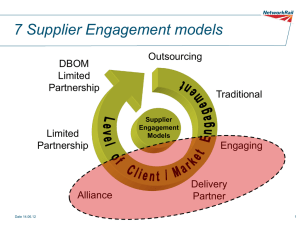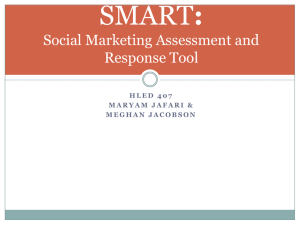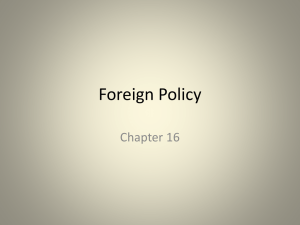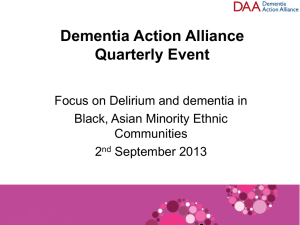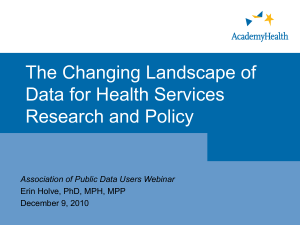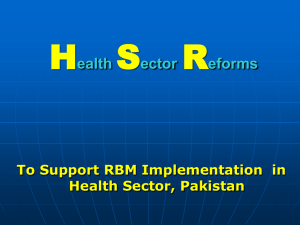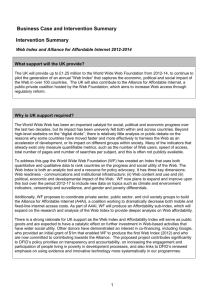Health Systems Research: History and Evolution
advertisement
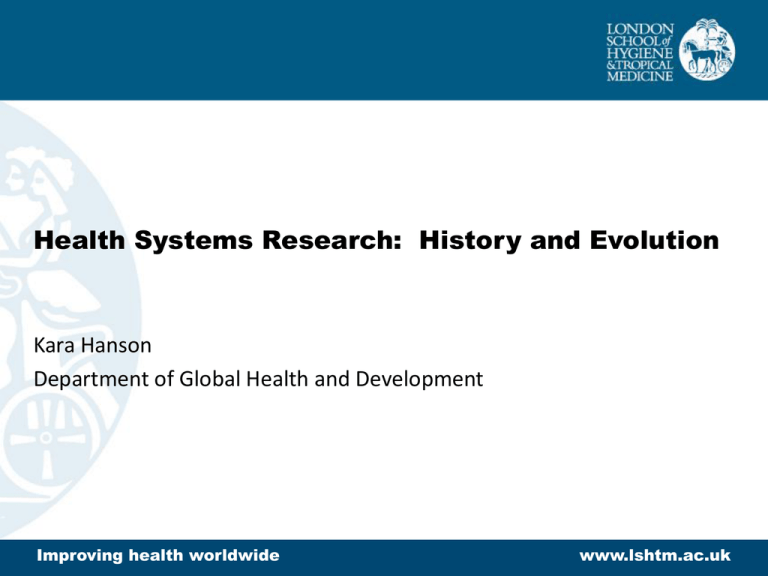
Health Systems Research: History and Evolution Kara Hanson Department of Global Health and Development Improving health worldwide www.lshtm.ac.uk Outline • • • • 1. Origins and evolution of health systems research 2. What is HPSR – methods and models 3. Recent methodological developments 4. Key challenges Evolution of thinking about health systems Global Fund For AIDS, TB, Malaria (2002) “New public Health systems Management” facility 2000 World Health Report Selective PHC Health systems WB Investing in Health (1993) Disease control programmes (Malaria, Alma Ata “Grandes PHC (1978) endemies”) 1980 1960 Recognition of system underpinnings World Bank Agenda for Reform (1987) 2000 2020 Commission on Post-2015 Macroeconomics development and Health (2001) goals Global Alliance for Vaccines and Immunisation (2001) Health systems Strengthening Funding (2005) From disease-specific to system-level questions Constraint Disease-specific response Health system response Financial inaccessibility, inability to pay, informal fees Exemptions, reduced prices for focal diseases Development of risk-pooling strategies Physical inaccessibility: distance to facility Outreach for focal diseases Reconsideration of long term plan for infrastructure development and siting of facilities Inappropriately skilled staff Continuous education and training workshops to develop skills in focal diseases Review of pre-service training curricula to ensure appropriate skills included in basic training Poorly motivated staff Financial incentives to delivery priority services Institution of performance management systems, clarifying roles and expectations, strengthened supervision, review of performance management, salary structures Adapted from Travis et al. Lancet 2004 Development of HSR as a field WHO Taskforce For HSR 2004 Intl conference on health research Health Systems for devt (2000) Global (2012) st 1 (2010) and Alliance for “Belgian school” 2nd (2012)Global HPSR (1998) Kasongo, National health Symposia on HSR WHO Ad Hoc Cttee on Bwamanda expenditure surveys Decentralisation Health Research (1996) 2000 2020 1980 1960 DFID DFID Good Health at HEFP (1990-4) HSD Low Cost (2012) PublicProgramme Private mix (2000-2005) Network RESYST (2011-16): Equity effects of Rural healthworker user fees retention; purchasing; Contracting accountability structures and reforms Health policy and systems research ...production of new knowledge ...to improve how societies organize themselves to achieving collective health goals, and how different actors interact in the policy and implementation processes to contribute to policy outcomes. ... interdisciplinary, a blend of economics, sociology, anthropology, political science, public health and epidemiology that together draw a comprehensive picture of how health systems respond and adapt to health policies, and how health policies can shape − and be shaped by − health systems and the broader determinants of health. (Alliance for Health Policy and Systems Research, 2011.) ...Encompasses “research ON policy” and “research FOR policy” Guided by a variety of health system models Sources: Gilson 2011 (WHO models); Smith and Hanson 2011. Driven by questions Macro: Architecture and oversight of systems Meso: Functioning of organisations and interventions Micro: Individual in the system Evaluative Does a new financing mechanism protect the poorest households from catastrophic costs? What are the reasons for low uptake of community-based health insurance? What financial and non-financial incentives will encourage health workers to locate in underserved areas? Exploratory / Explanatory Why do informal health markets continue to flourish where publicly provided services are adequate? How do pay-forperformance arrangements interact with local accountability structures? Why do frontline health workers prescribe antimalarials to patients with a negative test? Adapted from Sheikh et al. PLoS Medicine 2011 Recent methodological developments in HPSR • “Systems thinking” – Recognizing complexity and interaction • Advances in (non-experimental) impact evaluation – – Theory-based evaluation – Evaluation of complex interventions Evaluating complex interventions • Number of and interaction between components • Number of and difficulty of behaviours required by those receiving the intervention • Number of groups / organisational levels targeted by the intervention • Number and variability of outcomes • Degree of flexibility/tailoring of intervention permitted Source: MRC Guidance for Evaluating Complex Interventions Theoretical understanding Process evaluation Unintended consequences Key Challenges in HPSR • • • • • Building capacity to undertake and use HPSR Demonstrating rigour Generalisability Funding Influencing policy and practice References • Mills A. 2011. Health policy and systems research: defining the terrain; identifying the methods. Health Policy and Planning. • Sheikh K et al. 2011. Building the field of health policy and systems research: framing the questions. PLoS Medicine 8(8). • Gilson L, ed. 2012. Health policy and systems research: A methodology reader. Geneva: Alliance for Health Policy and Systems Research. • Adam T and de Savigny D. 2009. Systems thinking. Alliance for Health Policy and Systems Research. Geneva.

